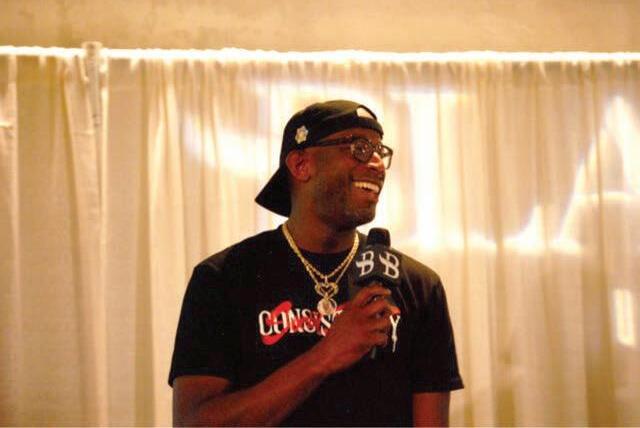
5 minute read
The Last Teardrop Has Fallen: The Life of Bobby Wilson
Bobby Wilson revives the musical legacy of his father, Jackie Wilson, against all odds.
By Wayne Trujillo
By simultaneously following and avoiding his father’s footsteps, Bobby shares his life’s joy and pain through song and dance.
The Last Teardrop is a documentary about the remarkable journey of Bobby Wilson, a singer who gained critical acclaim for his uncanny impersonation of R&B soul singer, Jackie Wilson. Directed by Tony Grier, it is a story of redemption that discusses the complexities of the foster care and adoption systems in America.
Riddled with anomaly and irony, the film features two protagonists – one whose story begins in a foster home, and another whose story ends in a nursing home. The story that ends in a nursing home is that of Jackie, a legendary name in the music world. The one that begins in a foster home follows Bobby, Jackie’s son, who lived decades of his life as Bobby Brooks, unaware of his paternal lineage even as he made a living emulating it.
The intertwined stories swing between episodes of happiness and heartbreak; adulation and abandonment. The Last Teardrop, a title that suggests eventual respite from an emotionally tolling experience, is a fascinating excursion into paradoxical extremes.
Viewers will encounter the drama and dazzle of Jackie’s life and artistry with all the expected riches, rags, and heartache associated with midcentury stardom. Yet, the talent, tenacity, and redemption threaded throughout Bobby’s story will make an unexpected impression and provide a deeper understanding of the intricacies involved in the life of the famed singer.
Jackie is no longer present to testify to the soaring highs and searing bottoms of his personal and professional travels, but during a brief break from a whirlwind tour, Bobby managed to share bits of his story in advance of a Dec. 4 documentary screening at Denver’s AMC Dine-In movie theater at the Cherry Creek Mall. If his father’s fate matches the song titled, “Lonely Teardrops,” then
Bobby’s continuing saga resembles the grit and grace of Mahalia
Jackson’s “How I Got
Over.”
The Last Teardrop is ultimately about triumph, despite the tragedy passed on to several of Jackie’s children during the course of his life. He lost a teenage son and daughter, who hadn’t yet reached middle age, to gun violence in two separate incidents. Another daughter suffered a fatal heart attack at age 24.
Bobby’s journey could have ended in a similarly tragic fashion, but due to a series of alternate paths – more happenstance than a calculated means of survival – he embarked on a journey that has spanned the globe, with no plans of stopping or slowing down. In addition to being appreciative of his apparent good fortune, he is eager –even anxious – to share his experiences and the hope they’ve instilled.
As countless performers can attest, Jackie is a hard act to follow. Known as “Mr. Excitement” in the 1950’s, his thrilling stage presence, suggestive dance moves and fouroctave vocal range wowed audiences and marked the transition from R&B to pop music. Bobby assumes the challenge of following his father’s performances with all the confidence and coolness of the original.


Today, Bobby entertains international audiences for a living. He gives an astoundingly accurate impersonation of his late father, and not only physically resembles Jackie, but resurrects the voice and music that propelled him to fame. For friends and fans of Jackie, Bobby is the icon incarnate. To those who weren’t alive when the legend last boogied across stages half a century ago, the performance is a once-in-a-lifetime phenomenon that they wouldn’t ever have experienced otherwise.
Despite the striking similarities between father and son, it would be flawed to label Bobby a copycat. Physical and performance resemblances aside, Bobby inherited his father’s artistic temperament, with an innovative streak that disallows him from remaining in one place or act for long.
While Bobby revives the memory and moves of his deceased father, he moves beyond the spectacular on-stage parameters and boosts each per- formance to a level all his own. Audiences may interpret his shows as a replica of Jackie’s, but he possesses a unique personality beneath his father’s pompadour and has solidified his own artistic identity.
The Last Teardrop features footage of Jackie in his prime –the dazzling wunderkind slaying audiences with a range of vocals and frenetic moves that earned his reputation and “Mr. Excitement” moniker. In contrast, the documentary shows Bobby’s personal journey from foster care to the military to the world of entertainment. The narration of his early years in a South Carolina foster home is particularly powerful.
Interviews with foster care professionals explain the pitfalls that often derail foster youth, which Bobby was fortunate to avoid. Instead of experiencing the all-too-common scenarios of school dropouts, homelessness and incarceration, he made a successful passage into life as a productive adult. However, he still encountered isolation and uncertainty like many of his peers in the foster care system, in addition to other hardships that spanned his early years.

Bobby was welcomed into his childhood home by a devoted foster mother, who, while imperfect and facing her own challenges, spent hours assisting and nursing him through various ailments. “Through the physical challenges I had, she made me strong,” he recalls.
Remembering his upbringing, he describes a childhood plagued by frequent hospital visits due to pulmonary and intestinal issues. When he was around five years old, doctors broke his legs in order to realign his lower limbs because his knees resembled elbows and he could not stand erect.
“Recovery was slow,” Bobby says, referring to the two years he spent in a cast, followed by an additional four years wea- ring leg braces. When he first viewed the movie Forrest Gump, decades later, he was flooded with memories of his own matching metal braces.
By age 15, Bobby was ready to call it quits. “I told the Lord that I was ready to go,” he says. “There was trauma there.”
Overwhelmed by assorted ailments, doctors predicted that Bobby would not reach adulthood. The strong adversity nearly broke his will but eventually, it deepened his faith.
“What really brought me through was my upbringing in church,” he explains. “My church thought I’d be a preacher.”
His interest in girls and traveling the world upended ministerial expectations, as he sought to escape the stifling oppression of the American South. “South Carolina was killing my spirit,” he says. “The prejudice – I couldn’t take it.”
Enlistment in the United States Navy provided Bobby with a much-needed escape, and he anticipated a 20-year career until a kidney stone and subsequent medical discharge ruined his military retirement plans.
While living in Hawaii, visits to the officer’s club led to a fated encounter with the world
Continued on page 6
Bobby Wilson
Continued from page 5 of entertainment. Initially reluctant to perform during the club’s regular karaoke events, Bobby finally relented and the audience went wild.
“The first time I sang, people went crazy,” he recalls. His amateur debut led to an eventual membership in the group “Love Notes,” before he went on to create a solo act, officially becoming a Jackie Wilson impersonator.
Bobby assumed Jackie’s artistic identity after encouragement from audiences and music professionals who noted his resemblance to the legendary singer. People who knew Jackie personally, like members of the vocal quartet “Four Tops,” commented on the striking similarities between Bobby and Jackie. They also openly voiced suspicions that the two might actually share a familial connection.
The results of a DNA test confirmed all the suspicions, and Bobby realized that the icon he was professionally impersonating was, in fact, his biological father.
The Last Teardrop documentary presents a riveting series of inexplicably intertwined stories. It revisits Jackie’s brilliance and later decline, detailing how the last curtain for the once-cosmic talent dropped – not onstage at the Apollo, but at a New Jersey nursing home in 1984. It delves into Bobby's powerful story of survival and surprise from his troubled adolescence to astounding success.

As audiences witness the fascinating genetic evolution of musicianship across generations, The Last Teardrop, explores the ways in which the human spirit can endure and be revived through faith and art.. Editor’s Note: For more information and screening details, visit www.thelastteardrop.com.










